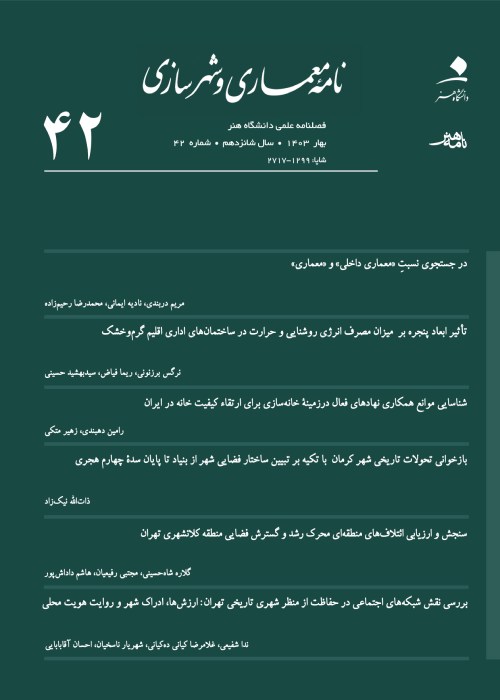A Model for Stakeholders’ Conflict Management in Urban Regeneration Based On Collaborative Governance
Author(s):
Article Type:
Research/Original Article (دارای رتبه معتبر)
Abstract:
Stakeholders’ conflicts in urban regeneration leads to incompatibility, disagreement, and inconsistency within or between stakeholders. Lack of these conflicts management may not allow that the whole capacity of participation to be realized, and consequently fails to attain urban regeneration. Therefore, recognition of the existing conflicts among stakeholders and representing a proportional pattern for conflict management is of great importance. The institutional approach in urban regeneration management processes is concerned with the creation of "institutional capacities in local communities." In other words, through supporting and developing the community networks, and through creating a wider network of trust and support, the intended objectives including stakeholder conflict management in urban regeneration can be achieved. A "cooperative approach" is needed to build institutional capacity. Collaborative approaches in urban regeneration can assist the creation of the fields that can act as learning environments in which stakeholders learn new methods of communication. Governance is considered as the basis where institutions can play their roles and is known as a decision-making process through the collaboration of multiple stakeholders. This model of governance bring many stakeholders together in associations held in common with public organizations to participate in consensus-based decision-making. Identifying the influential components of stakeholders’ conflict management in urban regeneration, with collaborative governance approach, leads to organizing the mutual relations among the stakeholders (state, local community, public section, and private section), as well as providing the conditions to achieve the objectives of community regeneration. This study intended to present a conceptual model for "stakeholder conflict management in urban regeneration based on collaborative governance." In the recommended model, we clarified the main components, including the institutional design of urban regeneration, conflict management, and collaborative governance approaches that affect the conflict between community regeneration stakeholders and their interactions. Collaborative governance and collaborative planning process is the consequence of community innovation based on community conditions. However, it is possible to reveal a conceptual model, which includes the main stages of providing basic conditions of incorporating cooperative engagement in the process of urban regeneration. Clearly, each proposed conceptual model is localized considering its institutional necessities. Thus, the model presented for conflict management must be coordinated with the institutions in Iran and concerning a more precise application, be coordinated with the institutional context of communities. According to this model, after identifying various types of conflicts between community stakeholders, i.e. cognitive conflicts, conflict of objectives or interests, normative conflicts, and conflicts of relationships, which are proportionate with various conflict management styles, i.e. obliging, integrating, dominating, avoiding, compromising, we determine the status of each type of conflicts in the process of interventional management in the local community urban regeneration design. Such a variables as trust, understanding, legitimacy, and shared commitment are the most substantial components effective in the collaborative process, which eventually lead to institutional capacity building and changes in the system that help to make our institutions more effective and adaptive.
Keywords:
Language:
Persian
Published:
Journal of Architecture and Urban Planning, Volume:11 Issue: 21, 2019
Pages:
123 to 143
magiran.com/p1943352
دانلود و مطالعه متن این مقاله با یکی از روشهای زیر امکان پذیر است:
اشتراک شخصی
با عضویت و پرداخت آنلاین حق اشتراک یکساله به مبلغ 1,390,000ريال میتوانید 70 عنوان مطلب دانلود کنید!
اشتراک سازمانی
به کتابخانه دانشگاه یا محل کار خود پیشنهاد کنید تا اشتراک سازمانی این پایگاه را برای دسترسی نامحدود همه کاربران به متن مطالب تهیه نمایند!
توجه!
- حق عضویت دریافتی صرف حمایت از نشریات عضو و نگهداری، تکمیل و توسعه مگیران میشود.
- پرداخت حق اشتراک و دانلود مقالات اجازه بازنشر آن در سایر رسانههای چاپی و دیجیتال را به کاربر نمیدهد.
In order to view content subscription is required
Personal subscription
Subscribe magiran.com for 70 € euros via PayPal and download 70 articles during a year.
Organization subscription
Please contact us to subscribe your university or library for unlimited access!



